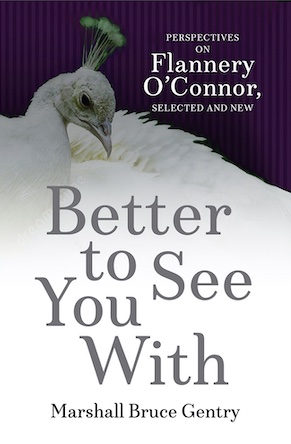By Allen D. Boyer
A skilled and faithful exegete, Marshall Bruce Gentry (ΦBK, University of Arkansas) has steadily broken ground in the study of a writer who added to the American canon a sardonic vision of the bizarre and the profane. “I used to say that my job is a matter of working for Flannery O’Connor, of doing whatever I think she would want,” Gentry says; and he adds, “I continue to create my version of O’Connor, and she continues to elude me.”
O’Connor is known for narratives that feature religious themes and grotesque characters. Finding new connections, this book links O’Connor to other Georgia novelists: Alice Walker, Carson McCullers, and Erskine Caldwell. It also sketches O’Connor’s reading in Vladimir Nabokov (she read Pnin in The New Yorker) and the sardonic Nikolai Gogol of Dead Souls. “The Displaced Person” may echo James Joyce’s “The Dead.”
O’Connor competed, somewhat, with McCullers, offering cartoons to The New Yorker around the time that McCullers’ short stories were being published there. O’Connor wrote that “Mr. Truman Capote makes me plumb crazy”; he said that she “has some fine moments, that girl,” and stole from “A Good Man Is Hard to Find” when he was writing In Cold Blood.
Gentry teaches at Georgia College in Milledgeville—the town where O’Connor lived and went to college (Georgia College, then the Georgia State College for Women, was O’Connor’s alma mater, before she went on to the Iowa Writers’ Workshop). This book offers explorations of Milledgeville history and life at Andalusia, the O’Connor family’s farmhouse on the road north of town—gunplay recalled in “Good Country People” (and Pete Dexter’s novel Paris Trout), and quarrels among farmhands that underpin “The Displaced Person.”
Milledgeville is also where O’Connor wrote during the years when she bitterly fought lupus, which crippled her body and killed her at the age of 39. There is a neighborly discretion in how Gentry mentions O’Connor’s sickness obliquely, without dwelling on details. He advises that, although she was not progressive on civil rights matters, “O’Connor’s voice may ultimately be more powerful, in the long run, as we pay more attention to her race, class, gender, and disability.”
This befits a scholar named Gentry—O’Connor might have observed that, given her penchant for naming characters Freeman, Hopewell, Motes, and The Misfit. It is a note that Alice McDermott has forthrightly struck with her comment that “it was the illness I think that made her the writer that she is.” O’Connor drew the connection herself: “Grace changes us, and change is painful,” she wrote.
“Reading O’Connor is valuable, useful, pleasurable, even therapeutic,” Gentry warns. “We do our best job of honoring Flannery O’Connor when we discover her followers to be reinterpreting her—even, perhaps, profitably distorting her—rather than make themselves carbon copies of her. O’Connor encourages us to view her as yet another Philosophical Criminal—dangerous but potentially transfiguring, perhaps because she too does not allow us to understand her perfectly.”
The 20 pieces presented here include two interviews and three unpublished essays. They represent decades of answering questions and posing others. Gentry has looked at O’Connor so diligently that he can speak with a fitting, unsettling sense of her looking back at him.
Allen D. Boyer (ΦBK, Vanderbilt University), a native of Oxford, Mississippi, lives and writes on Staten Island. Vanderbilt University is home to the Alpha of Tennessee Chapter of Phi Beta Kappa.
Author Marshall Bruce Gentry is a Phi Beta Kappa member from the University of Arkansas, where he was inducted in 1974.




